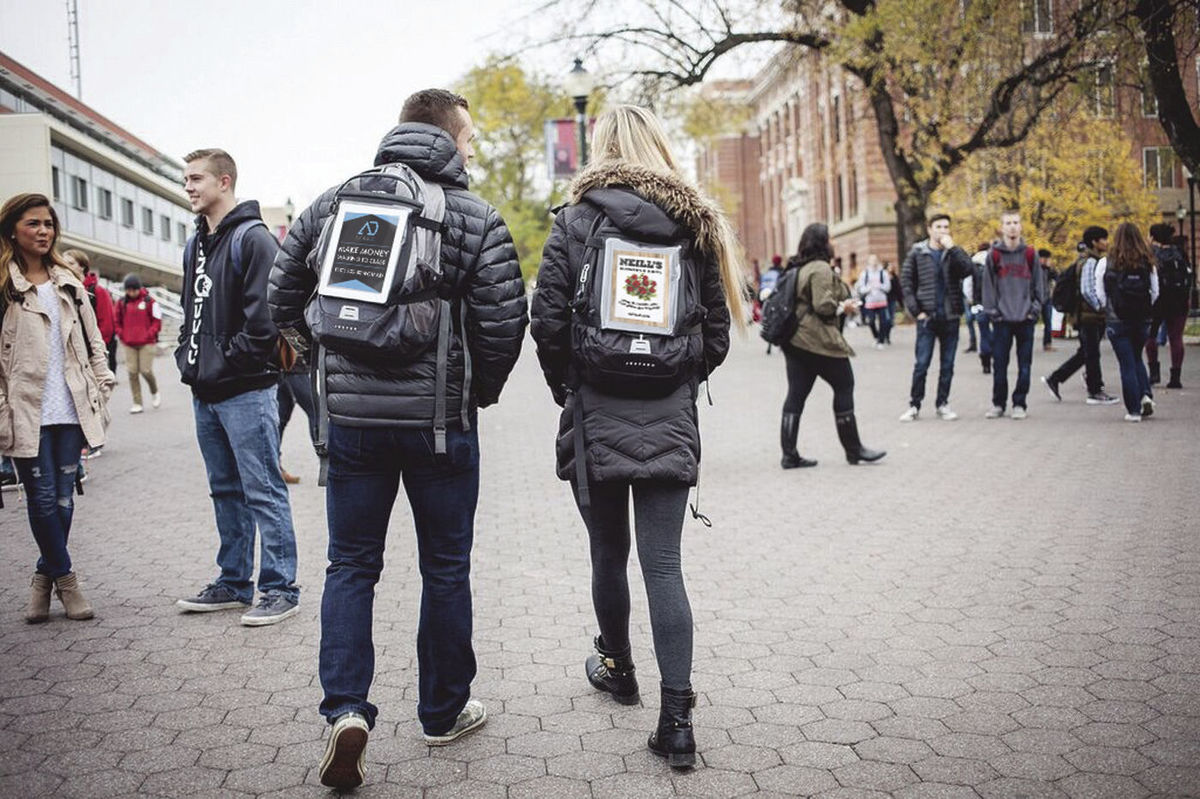By Anthony Kuipers
Moscow-Pullman Daily News, Moscow, Idaho
WWR Article Summary (tl;dr) A new form of marketing is making a splash at Washington State University and it is now spreading to other schools as well. “nomAD Campus”, a company that officially launched in September, employs students to walk around with an iPad placed in the back of his or her backpack displaying advertisements.
Moscow-Pullman Daily News, Moscow, Idaho
Recent Washington State University graduates are helping companies advertise their messages to college campuses through an unusual, but effective method — turning people into walking billboards.
Go to the University of Washington, Stanford or San Diego State University and one might spot a student walking around with an iPad placed in the back of his or her backpack displaying an advertisement for Gatorade or Microsoft. Or they might find information about school clubs or the latest scores from athletic events.
Those students were hired by nomAD Campus, a company that officially launched in September, but was developed over the past year by a WSU student and his friends.
Jonah Friedl, CEO of nomAD, said he was involved in multiple campus organizations, including student groups, clubs, Greeks and philanthropies. While trying to raise awareness about the events he was involved in, the entrepreneurship major ran into a challenge.
“We were having such a hard time reaching our fellow peers,” he said,
The obvious choice was using social media, but, he said, millenials often regard advertisements they see on Facebook and Twitter as spam. That means getting their attention requires some creativity.
So they decided to advertise in a place they know their message will be seen: on campus when students are walking to and from class.
Friedl said his friends began walking around campus with iPads displaying information about these groups, and it worked.
A walking billboard, as he calls it, offers a friendly face behind the ads that people can interact with. That human element, he said, “takes it to next level.”
The next challenge was trying to expand their circle of “carriers” beyond their friends.
Even millenials who may initially scoff at such an idea have incentive to be hired by nomAD. Friedl said they are paid by the hour and can set aside a percentage of their earnings to go toward a charity of their choice.
Additionally, the job is supposed to be easy. They simply go about their daily routine, while being willing to interact with students.
Friedl likens this business model to the ride-sharing service Uber, which is intended to allow people to make money on their own schedule. That’s important for someone trying to balance their work life and school life, he said.
Companies or university organizations work with nomAD to spread their message on campus.
buy viagra capsules generic buy viagra capsules online no prescription
nomAD assigns advertisements to students based on who they are and where they go on campus. Student athletes for example, will advertise sports products.
Members of the student body government can advertise events happening on campus.
“It’s content that’s engaging to them,” he said.
Friedl said nomAD can then track where their advertisements were seen and how many people saw them.
During this past summer, Friedl and his friends took their idea to the WSU’s Business Plan Competition and the Northwest Entrepreneur Competition. While Friedl admits they “bombed” their presentation, they still won cash prizes and recognition, including “best technology venture.”
In order to grow their business, Friedl said, they thought it best to target schools like UW and Stanford in metropolitan areas. In August, they expanded their service into San Diego State University, and among those three universities have a waiting list of 200 people to become carriers.
This coming March, they are looking to bring their services to seven other Western universities, including the University of Oregon and the University of Southern California. Friedl said nomAD, which is currently based out of Kirkland, Wash., plans to bring its services back to Pullman, as well as the University of Idaho.














































































































































































































































































































































































